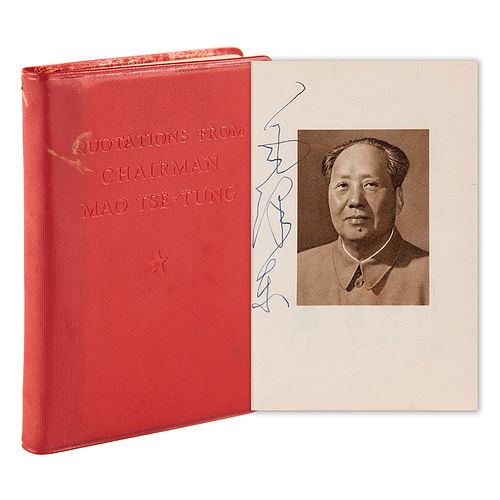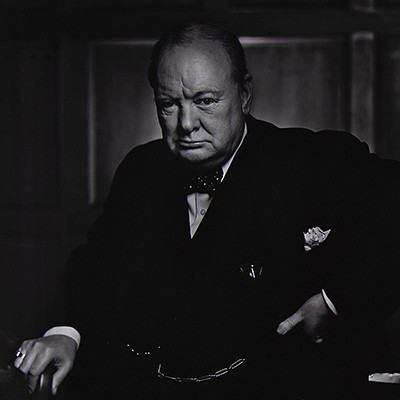Mao Zedong Historically Important Signed Book: Quotations from Chairman Mao (The Little Red Book) - Autographed for the Wife of Pakistan's Foreign
Two ways to bid:
- Leave a max absentee bid and the platform will bid on your behalf up to your maximum bid during the live auction.
- Bid live during the auction and your bids will be submitted real-time to the auctioneer.
Bid Increments
| Price | Bid Increment |
|---|---|
| $0 | $5 |
| $50 | $10 |
| $200 | $25 |
| $500 | $50 |
About Auction
Feb 22, 2024
RR Auction's first-ever February installment of its Remarkable Rarities series brings some 50+ pieces of history to the auction block, representing the most elusive and extraordinary items offered all year. RR Auction support@rrauction.com
- Lot Description
Incredibly rare and historic signed book: Quotations from Chairman Mao. First English edition. Peking: Foreign Languages Press, 1966. Softcover bound in red vinyl covers with embossed title and star, 3.75 x 5.25, 312 pages. Signed in the border of the frontispiece portrait in fountain pen by Mao Zedong. Chairman Mao signed this book in October 1966 for the wife of Foreign Minister of Pakistan Sharifuddin Pirzada (1923-2017), who was the first statesman invited to visit the Chinese government after the beginning of the ‘Cultural Revolution’; the moment that Mao signed the book was captured on film. The foreign minister's name is inscribed on the first free end page in blue ballpoint, "Syed Sharifuddin Pirzada, Peking, 25th October 1966." Autographic condition: fine. Book condition: VG/None, with a bit of wrinkling to the bottom of the title page and some soiling to the bright red vinyl wrappers.
Foreign Minister Pirzada and his wife arrived in Peking on October 22, 1966, to conduct a friendly diplomatic visit—making him the first statesman to make an official visit to China after the beginning of the Cultural Revolution. The Peking Review of October 28th reported on the visit: 'Chairman Mao Tse-tung received Pakistan Foreign Minister Sayed Sharifuddin Pirzada and his wife on October 25, and had a cordial and friendly conversation with them...Foreign Minister Pirzada said that the friendship between Pakistan and China was based on the genuine and fundamental interests of the two countries and the two peoples. He pointed out that the policies of both countries provided an excellent basis for strengthening this friendship. Sino-Pakistan friendship and co-operation, he added, was a demand of our times and any attempt to interfere with it would never succeed. The Pakistan Foreign Minister thanked the Chinese Government and people for their support to the Kashmiri people's just struggle. He said that the Government and people of Pakistan would never forget the support and aid given by the Chinese Government and people when Pakistan met with aggression. He pointed out that China's support to Pakistan in fighting against aggression was a stabilizing factor in South Asia.' Accompanied by a photocopy of the article.
When Pirzada was elevated to Foreign Minister in 1966, The Guardian reported: 'Mr. Pirzada is expected to exert a wholesome influence...Pakistan will continue to maintain good relations with China...but in the coming months there is going to be an earnest effort to restore friendly relations with the United States without hurting Peking. Mr. Pirzada can be relied upon to forge a level-headed and balanced policy towards the 'two worlds.'' Pirzada was successful in those efforts, cultivating strong ties with both the United States and China as the two hostile nations began to consider rapprochement. Helping to close the communication gap between the two countries, Pakistan would play a pivotal role in organizing Henry Kissinger's secret visit to Beijing in 1971, followed by President Nixon's historic official trip to China in 1972—considered by many to be the greatest diplomatic achievement of the 20th century.
Widely known as Mao's 'Little Red Book,' the pocket-sized 'Mao Zhu Xi Yu Lu' [Quotations from Chairman Mao Tse-tung] was first printed in Chinese in 1964 and widely distributed during China's Cultural Revolution. The first English version was published in 1966 by the Communist Party's Foreign Languages Press, and versions into over thirty other languages soon followed. An icon of Red China and the Cultural Revolution, the Little Red Book's thirty-three chapters contain quotations from Mao's speeches and writings, organized by topic: the Communist Party, class and class struggle, socialism and communism, war and peace, imperialism, the People's Army, politics, patriotism, and culture are all touched upon in the famous work. Rarely found in autographed examples, this is one of just a handful to be offered at auction in the past few decades—and none have been bolstered by such exceptional provenance. A remarkable signed first edition of this historic and influential book, which helped to shape China's cultural and political paths in the 20th century. - Shipping Info
-
Bidder is liable for shipping and handling and providing accurate information as to shipping or delivery locations and arranging for such. RR Auction is unable to combine purchases from other auctions or affiliates into one package for shipping purposes. Lots won will be shipped in a commercially reasonable time after payment in good funds for the merchandise and the shipping fees are received or credit extended, except when third-party shipment occurs. Bidder agrees that service and handling charges related to shipping items which are not pre-paid may be charged to a credit card on file with RR Auction. Successful international Bidders shall provide written shipping instructions, including specified Customs declarations, to RR Auction for any lots to be delivered outside of the United States. NOTE: Declaration value shall be the item’(s) hammer price and RR Auction shall use the correct harmonized code for the lot. Domestic Bidders on lots designated for third-party shipment must designate the common carrier, accept risk of loss, and prepay shipping costs.
-
- Buyer's Premium



 EUR
EUR CAD
CAD AUD
AUD GBP
GBP MXN
MXN HKD
HKD CNY
CNY MYR
MYR SEK
SEK SGD
SGD CHF
CHF THB
THB















